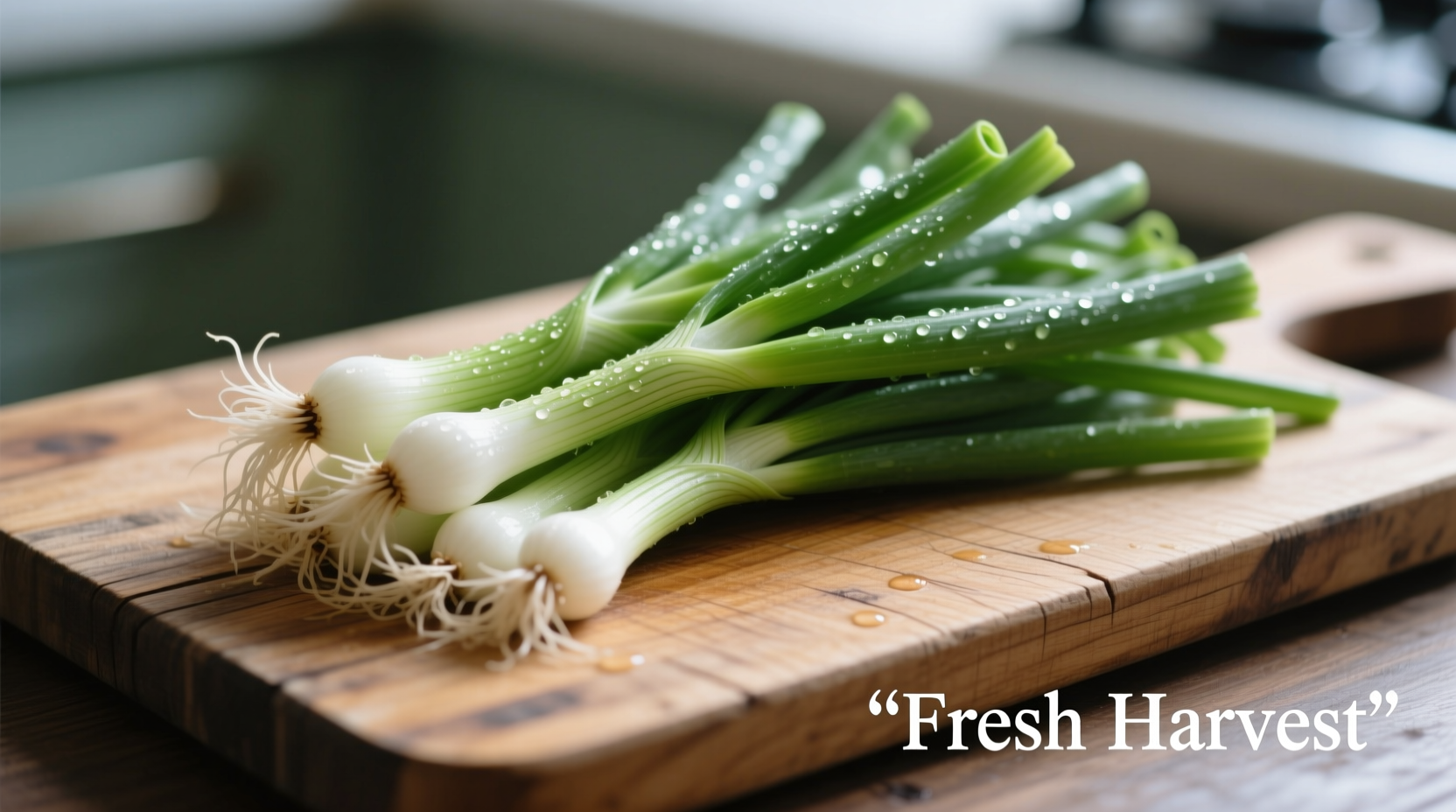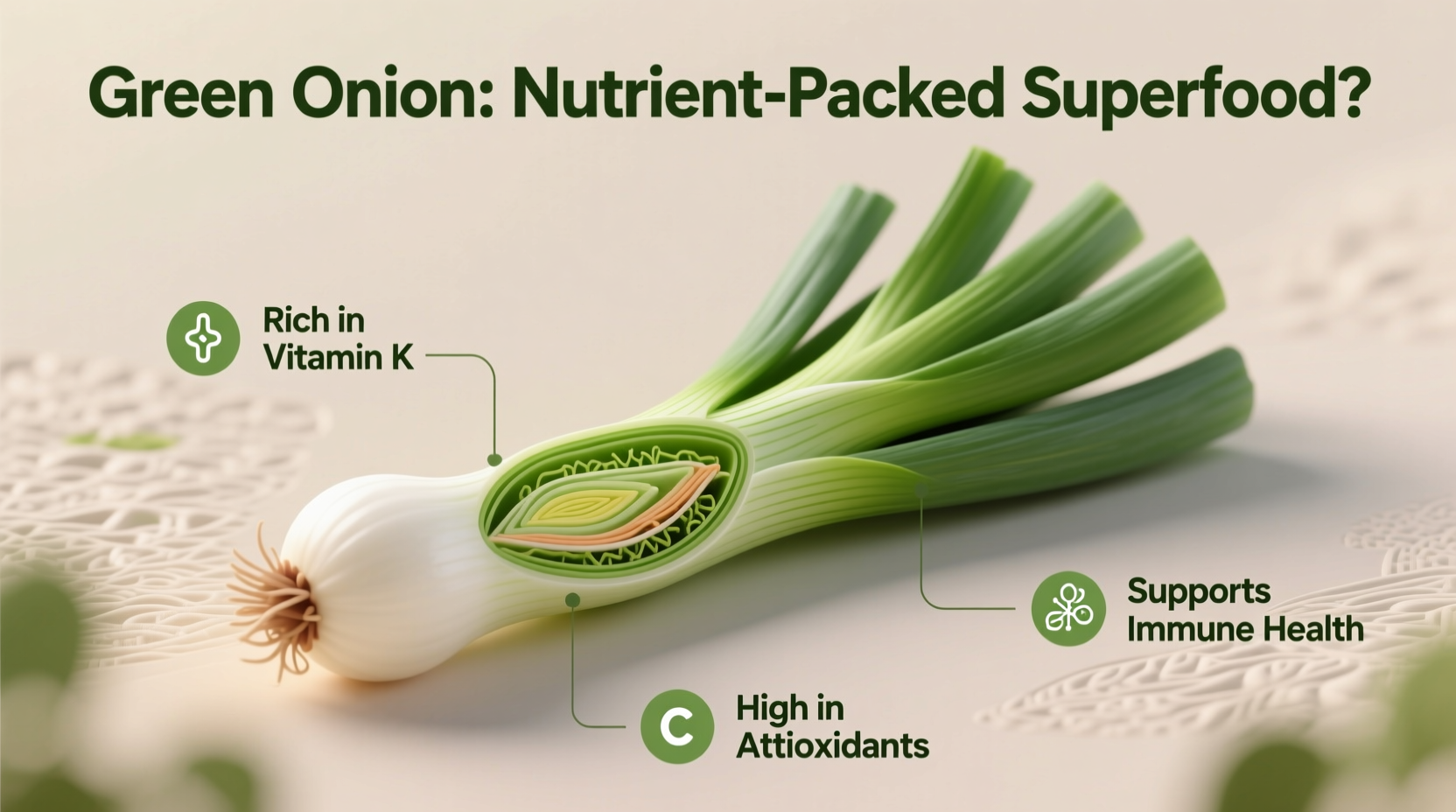When you're wondering is green onion good for you, the answer is a resounding yes - with science-backed benefits that make them a nutritional powerhouse in your kitchen. Unlike their mature onion cousins, green onions (also called scallions) offer a milder flavor while packing impressive health-promoting compounds that support multiple body systems.
Nutritional Powerhouse in Every Sprig
Green onions stand out among vegetables for their exceptional nutrient density. These slender alliums deliver essential vitamins and minerals with remarkably few calories, making them an ideal addition to any health-conscious diet. Let's examine exactly what makes green onions nutritionally special.
| Nutrient | Per 100g | Daily Value % | Key Health Benefits |
|---|---|---|---|
| Vitamin K | 207 mcg | 172% | Bone health, blood clotting, cardiovascular protection |
| Vitamin C | 18.8 mg | 21% | Immune function, antioxidant protection, collagen synthesis |
| Vitamin A | 1182 IU | 24% | Vision health, immune support, skin integrity |
| Folate | 72 mcg | 18% | Cellular function, DNA synthesis, red blood cell formation |
| Calcium | 72 mg | 7% | Bone strength, muscle function, nerve signaling |
This nutritional profile comes with only 32 calories per 100 grams, making green onions an exceptionally efficient way to boost your nutrient intake without adding significant calories to your meals. The USDA FoodData Central database confirms these values, providing reliable reference information for health-conscious consumers.
Science-Backed Health Benefits You Can Trust
Research published in the Journal of Agricultural and Food Chemistry reveals that green onions contain organosulfur compounds similar to those found in garlic and regular onions, but with a more delicate flavor profile. These compounds contribute to several important health benefits:
Cardiovascular Protection
The flavonoid quercetin in green onions has been shown to reduce inflammation and lower blood pressure. A 2022 review in Nutrients highlighted that regular consumption of allium vegetables correlates with a 15-20% reduced risk of cardiovascular disease. Green onions' vitamin K content also helps prevent calcium buildup in arteries, supporting healthy blood flow.
Bone Health Support
With over 100% of your daily vitamin K needs in just one cup, green onions significantly contribute to bone mineralization. Research from the National Institutes of Health demonstrates that adequate vitamin K intake reduces fracture risk by improving calcium utilization in bones. This makes green onions particularly valuable for maintaining skeletal health as we age.

Immune System Enhancement
The substantial vitamin C content in green onions supports multiple aspects of immune function. According to the Linus Pauling Institute at Oregon State University, vitamin C enhances white blood cell function and acts as a powerful antioxidant that protects cells from damage. Regular consumption of vitamin C-rich foods like green onions helps maintain robust immune defenses.
Green Onions Through History: From Ancient Remedy to Modern Superfood
Green onions have been valued for both culinary and medicinal purposes throughout human history. Understanding their historical context helps appreciate their enduring health benefits:
- 2600 BCE - Earliest recorded use in ancient Egypt, where they were fed to laborers building the pyramids for strength
- 500 BCE - Documented in Chinese medical texts for treating colds and digestive issues
- 1st Century CE - Roman naturalist Pliny the Elder recommended scallions for vision problems
- 16th Century - Introduced to North America by European settlers
- 20th Century - Scientific research begins identifying specific compounds responsible for health benefits
- Present Day - Recognized as a functional food with multiple evidence-based health benefits
Practical Ways to Maximize Green Onion Benefits
Knowing is green onion good for you is just the beginning - understanding how to incorporate them effectively into your diet matters most. Here's how to get the maximum health benefits:
Selecting and Storing for Optimal Nutrition
Choose green onions with crisp, bright green tops and firm white bases. Store them upright in a glass with an inch of water in the refrigerator, changing the water every two days. This method preserves freshness and nutrient content for up to two weeks. The USDA recommends storing allium vegetables at 32-36°F (0-2°C) with high humidity to maintain maximum nutritional value.
Culinary Applications That Preserve Nutrients
To maximize health benefits while cooking:
- Add green onions at the end of cooking to preserve vitamin C
- Use both white and green parts - each contains different beneficial compounds
- Pair with healthy fats like olive oil to enhance absorption of fat-soluble vitamins
- Try raw in salads, salsas, and dips for maximum nutrient retention
When Green Onions Might Not Be Ideal
While green onions offer numerous health benefits, certain individuals should exercise caution:
- People on blood thinners - The high vitamin K content can interfere with medications like warfarin. The American Heart Association recommends maintaining consistent vitamin K intake rather than eliminating it entirely.
- Those with IBS - Green onions contain FODMAPs that may trigger symptoms in sensitive individuals. Monash University's research suggests that the green parts are generally better tolerated than the white bulb.
- Individuals with allium allergies - Though rare, some people experience allergic reactions to compounds in green onions.
Green Onions vs Other Allium Vegetables: Making Informed Choices
Understanding how green onions compare to other members of the allium family helps you make strategic dietary choices:
- Compared to regular onions - Green onions have higher vitamin K and vitamin C but lower quercetin content. They're gentler on digestion for many people.
- Compared to garlic - While garlic contains more allicin (a potent compound), green onions provide similar cardiovascular benefits with less digestive upset.
- Compared to leeks - Green onions have higher vitamin K content but leeks offer more folate and manganese.
For maximum health benefits, nutrition experts recommend rotating through different allium vegetables to gain the full spectrum of beneficial compounds they provide.
How Much Green Onion Should You Eat Daily?
While there's no official daily recommendation specifically for green onions, incorporating ½ to 1 cup (50-100g) daily provides significant health benefits without excessive intake. This amount delivers:
- 50-100% of your daily vitamin K needs
- 15-30% of vitamin C requirements
- Valuable antioxidants and phytonutrients
The Dietary Guidelines for Americans emphasizes consuming a variety of vegetables daily, with green onions serving as an excellent addition to your vegetable portfolio. They're particularly valuable for adding flavor without salt, supporting heart-healthy eating patterns.
Simple Ways to Add Green Onions to Your Daily Meals
Here are practical, delicious ways to incorporate green onions into your diet:
- Breakfast boost - Add chopped green onions to scrambled eggs or omelets
- Lunch enhancement - Sprinkle over salads, grain bowls, or sandwiches
- Dinner accent - Stir into soups, stir-fries, or roasted vegetables during the last few minutes of cooking
- Snack upgrade - Mix with Greek yogurt and herbs for a nutritious vegetable dip
- Flavor foundation - Use as a base for homemade salad dressings and sauces
Remember that the green parts contain more vitamin K while the white parts have slightly higher sulfur compounds - using the entire vegetable ensures you get the full range of benefits.











 浙公网安备
33010002000092号
浙公网安备
33010002000092号 浙B2-20120091-4
浙B2-20120091-4